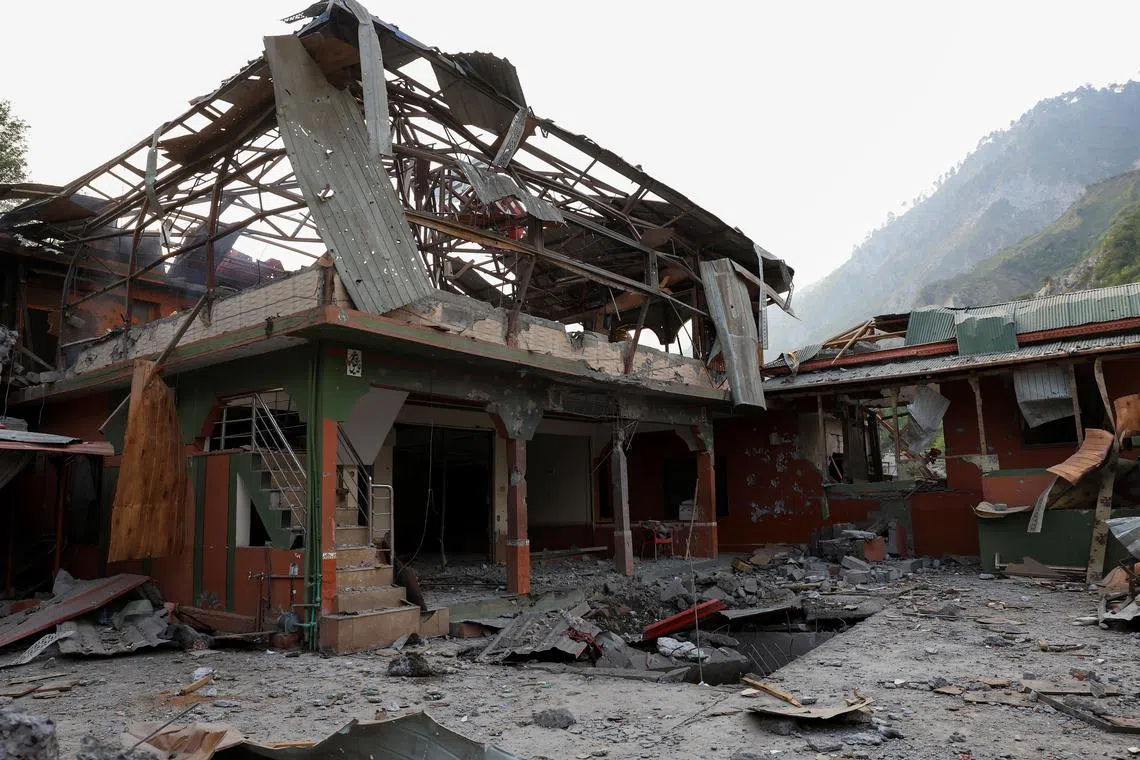Pakistan hails role of Chinese jets in repelling India strikes
Sign up now: Get insights on Asia's fast-moving developments

India conducted military strikes against nine targets in Pakistan early on May 7.
PHOTO: REUTERS
Follow topic:
ISLAMABAD – Pakistan said Chinese fighter jets were used to respond to military strikes by India and that it has kept Beijing fully informed of its action as tensions in the disputed Kashmir region escalate.
Pakistan’s Foreign Minister Ishaq Dar told Parliament late on May 7 that Chinese J-10C jets were used to shoot down five Indian fighter jets along the border, including French-made Rafale jets, the Associated Press of Pakistan news service cited him as saying.
India’s government has not officially confirmed whether aircraft it deployed in the military strike in the early hours of May 7 were destroyed.
Mr Dar said Beijing was kept informed about the military action soon after the strikes began, with the China Ambassador Jiang Zaidong visiting Pakistan’s Foreign Office at 4am local time on May 7.
Hostilities between India and Pakistan – nuclear-armed rivals who have clashed several times over the disputed region of Kashmir April 22 attack that killed 26 civilians
India said the attack was an act of terrorism
India conducted military strikes against nine targets in Pakistan early on May 7 that New Delhi said were “precise and restrained” and designed to be “non-escalatory in nature”.
The strikes were the deepest breach of Pakistani territory since the 1971 war.
Pakistan’s army said 31 civilians were killed in the strikes, while Prime Minister Shehbaz Sharif signalled on May 7 that the country would retaliate.
Pakistan’s army said on May 7 it shot down Indian jets, including three Rafales, a MiG-29, and an Su-30, without providing evidence.
At a New Delhi briefing, Indian Foreign Secretary Vikram Misri detailed the April militant attack and investigation but did not address Pakistan’s claim.
“India will have incentives to underplay the damage, but Pakistan playing up the damage here can mitigate incentives to escalate in turn,” Mr Ankit Panda, a senior fellow at the Carnegie Endowment for International Peace, wrote in a social media post.
Mr Panda said, with the proviso that much can change, “Pakistan will be compelled to retaliate with parity”, adding that this could include retaliatory strikes against nine targets.
China has called India’s military operation regrettable, with the Foreign Ministry in Beijing urging both sides to exercise restraint and refrain from taking actions that may further complicate the situation.
China is a major backer of Pakistan and its biggest supplier of weapons. Some 82 per cent of Pakistan’s arms imports from 2019 to 2023 came from China, according to data from the Stockholm International Peace Research Institute, which tracks global arms flows.
Pakistan’s claim that it shot down the Indian warplanes was a trending topic on China’s X-like Weibo, with some Chinese users celebrating the country’s military strength.
One top comment said if the news was accurate, “all of China’s major military-industrial enterprises will have orders queueing up”.
Mr Hu Xijin, the former editor-in-chief of the nationalist tabloid Global Times, wrote on WeChat that if Pakistan’s successful strikes occurred, it showed “China’s level of military manufacturing has completely surpassed that of Russia and France”, and that Taiwan should feel “even more scared”.
Shares of Chinese defence manufacturing companies rallied on May 7 after Pakistan’s claims.
The India-Pakistan conflict, if escalated, could also see largely unproven Chinese weapons being field-tested, which could address concerns about their combat capability, Bloomberg Intelligence analysts wrote in a note.
Russia and China have been the traditional suppliers of weapons to the South Asian countries and the flare-up in tensions come as Chinese President Xi Jinping went to Moscow
Mr Xi is due to have talks with Russian President Vladimir Putin on May 8.
US President Donald Trump on May 7 called the India-Pakistan conflict “so terrible” and said that he wanted the two nations to “work it out”.
“They’ve gone tit for tat, so hopefully they can stop now,” Mr Trump said in reply to a question during a White House event. “We get along with both the countries very well, good relationships with both, and I want to see it stop. And if I can do anything to help, I will be there.”
The last time the two sides came close to an all-out war was in 2019, after a suicide bomber killed 40 members of India’s security forces.
India blamed Pakistan and responded about two weeks later with its first air strikes on Pakistani soil since 1971.
Pakistan retaliated by shooting down an Indian jet and arresting the pilot, who was later released. Tensions died down soon afterwards.
While militarily both countries have the ability to inflict untold damage, in economic terms India increasingly has much more at stake.
India’s surging gross domestic product is now more than eight times the size of Pakistan’s, according to the World Bank, a gap that has roughly doubled since the turn of the century.
Pakistan, meanwhile, is only just beginning to emerge from a years-long economic crisis that brought it to the brink of bankruptcy, and is relying on a US$7 billion (S$9 billion) loan programme from the International Monetary Fund. BLOOMBERG

